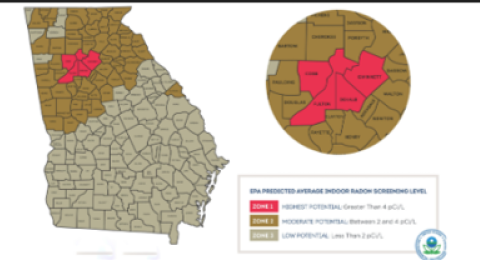
Georgia is known for its scenic landscapes, unique geological profile and historic sites like Stone Mountain Park in DeKalb County. What is not commonly known is that a hidden danger lurks beneath the charm – radon gas.
Understanding Radon
Radon is the leading cause of lung cancer among non-smokers.
It is a colorless, tasteless, and odorless radioactive gas, that seeps out of soil and rock from the natural decay of uranium and makes its way into the air. While harmless outdoors, it poses risks indoors, infiltrating homes through cracks and crevices, potentially reaching hazardous concentrations. Georgia's granite-rich soil, as illustrated by Stone Mountain and Metro Atlanta's granite quarries, contributes to local elevated radon levels because granite contains the naturally occurring radioactive elements like uranium, that release radon gas.
How Radon Enters the Home
Regardless of a home's build quality, radon can infiltrate through foundation cracks, gaps, and holes. Because of variances in air pressure, a house can essentially act as a vacuum, sucking in radon gas through even the most minor foundation openings. Once inside the foundation, radon gas spreads throughout the rest of the home, contaminating the indoor air.
Misconceptions about Radon
Contrary to common belief, elevated radon levels aren't exclusive to homes with basements. Any structure, whether new or traditional, with a full basement, crawl space, or built on a concrete slab, can have unsafe radon levels. The only way to know if a home is at risk or not, is to have it tested.
Testing and Mitigation Steps:
- Professional Radon Test: The first step is a professional radon test for accurate and quick results.
- Don't Panic: Elevated levels are manageable, with typically cost-effective solutions.
- Consult a Pro: Reach out to a radon mitigation specialist for expert advice.
- Seal the Cracks: Ensure your home is well-sealed to prevent radon entry.
- Ventilation is Key: Enhance airflow with proper ventilation systems.
- Retest Regularly: Ongoing monitoring ensures radon levels remain within safe limits.
To make sure you and your family are safe, have a radon test done by a professional. This will ensure that you have accurate and reliable results quickly so that you can take action if your home’s levels are elevated. At AmeriSpec of Loganville, we are certified to perform radon testing in Georgia, so we can let you know how much radon is in the home and what steps need to be taken to eliminate the risk.